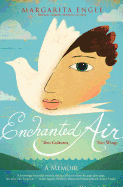
Newbery Honor author Margarita Engle (The Surrender Tree) reflects on her childhood as a kind of poetic travelogue, with one wing in her father's U.S. homeland and the other in her mother's native Cuba.
Through Engle's eyes, from early childhood through age 14, readers see her maternal grandparents' land as an escape from her home near Los Angeles. She feels the push and pull of her double-sided heritage: "Two countries./ Two families./ Two sets of words./ Am I free to need both,/ or will I always have to choose/ only one way/ of thinking?" What her mother views as deprivation in Cuba, young Margarita sees as "endless adventure," such as traveling by horseback or oxcart. When one of Abuelita's mares is expecting, she promises the foal to Margarita and her older sister. Yet that is not to be: the Bay of Pigs sprawls between them, cutting them off from their Cuban relatives. Margarita contrasts the intimacy of intergenerational relationships in leisurely paced Cuba with her hurried, isolated lifestyle in California. Engle describes the universal feelings of wanting to improve at things, such as horseback riding and making friends, as well as moments specific to her childhood, such as hiding under her desk during bomb drills.
Pair this with Marilyn Nelson's How I Discovered Poetry for a multilayered look at the 1950s from two young women who find their sense of belonging by writing poems. Engle's book opens a window into what resuming relations with Cuba means to generations of families forcibly separated for nearly 60 years. --Jennifer M. Brown, children's editor, Shelf Awareness

